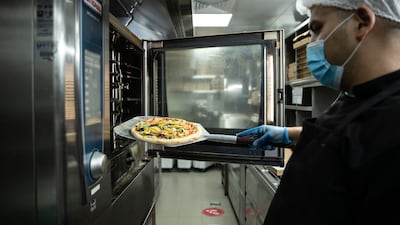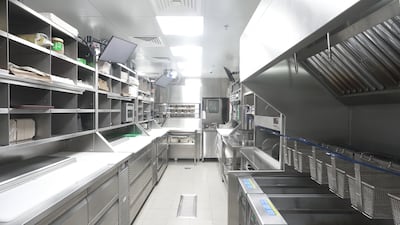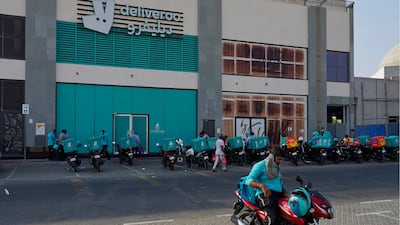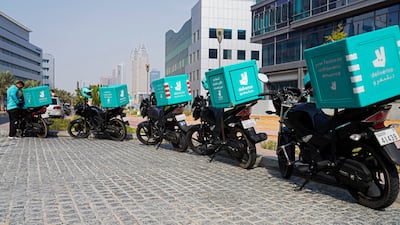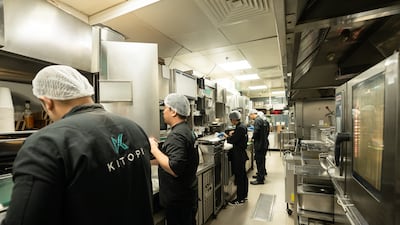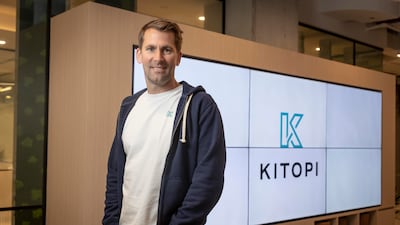You may not have heard its name, but you've probably eaten from one of its kitchens.
Kitopi – a start-up in Dubai that began only four years ago – says it is valued at a staggering $1 billion.
The company has reached that figure by investing in cloud kitchens – kitchens that prepare food only for delivery with no physical presence as a restaurant – but are now increasingly snapping up existing outlets across the Middle East.
Some of the more recognisable brands in the UAE Kitopi has bought up include Taqado, 800 Pizza, Under 500 and Pizarro.
chief operating officer, Kitopi
“Kitopi began by just offering a kitchen service to existing brands,” said chief operating officer Toon Gyssels.
“In the past six to nine months we [are being] more direct to the consumer," Mr Gyssels said.
Kitopi, which stands for "kitchen utopia", has teamed up with more than 200 brands in Saudi Arabia, Qatar, Bahrain and Kuwait and the UAE and has a 4,100-strong workforce.
How do they work? Many companies are tight-lipped but some restaurants pay the cloud kitchen provider a commission on each order, but then save on overheads such as rent and staff salaries.
Kitopi told The National nobody pays it to use the kitchens because all of the companies working with them are either completely owned by Kitopi or it has shares in them.
"Kitopi views itself as one restaurant with multiple brands," the company said.
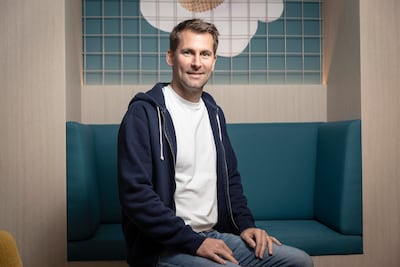
It said it reached the $1bn valuation after it raised $415 million in a new funding round led by SoftBank in 2021, although it did not provide specific details.
The company is also behind the Social Distrikt project in The Pointe, Dubai, which, similar to the Time Out Market in Souq Al Bahar, is a food hall where visitors can gather under one roof and choose from a range of different restaurants.
The huge valuation of the company, then, shines a light into this world of cloud, or ghost, kitchens. Customers once rang a restaurant directly and it delivered the food. While that still happens, increasingly cloud kitchens are taking over in a switch that underlines how convenience is king.
They offer delivery-only services from a centralised location through a mobile app. They allow established restaurants to expand in a much more cost effective way and their popularity soared during the Covid-19 pandemic when many people were forced to stay at home.
The global food delivery industry is estimated to be worth $150 billion, according to a report last year from management consultants McKinsey. The same report said the sector had tripled in value since 2017. According to Allied Market Research, the global cloud kitchen market is expected to grow at an annual rate of 12 per cent to reach $71.4bn by 2027.
Kitopi is not the only one in the UAE. Deliveroo's Hessa Street facility, for example, allows restaurants to rent space in 12 huge industrial kitchens, while Talabat also operates them, serving some of the most popular brands. But Kitopi is becoming a huge player.
It says the biggest challenge is getting to grips with the scale of the operation with so many different food items to cater for.
“Most restaurants have one menu with a limited number of items,” Mr Gyssels said.
“Kitopi has 7,000 menu items that customers can order from, which requires us to produce thousands of recipes each day.
“We need to have 4,000 ingredients in stock to be able to do that.”
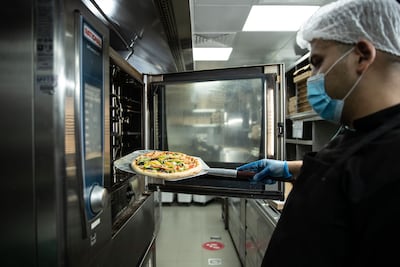
He estimates than an order leaves the Kitopi kitchens every five seconds during peak hours.
“There was an acceleration of consumer behaviour towards making online orders during the pandemic,” he said.
“The increased demand also led us to make the shift from not just operating kitchens to running restaurants as well.”
It was not all plain sailing for Kitopi during the pandemic though.
“We were in the middle of expanding into other GCC countries when suddenly there were travel restrictions,” Mr Gyssels said.
“Some visas were banned and it was very difficult to hire people during the pandemic.”
While the company was valued at $1 billion in its first three years, he is bullish that it will not take that long to double that figure.
“$2 billion we can easily do just from the five markets we are in right now, maybe even $5 billion,” Mr Gyssels said when asked if the company is planning on moving into new territories – this year at least.
“For 2022 we are focusing on expanding in the countries we are already in.
“Over the course of this year, we'll probably be adding 100 kitchens and restaurants to our portfolio.
“2023 is the year we are earmarking to hopefully start making the move into international expansion.”
While many companies have enjoyed success with the cloud kitchen model, Mr Gyssels said the future will require companies to do more than just deliver food.
“Having a model that is cloud only where customers can only get their food delivered is not enough,” he said.
“Customers still want to have a physical experience in a building made from bricks and mortar."
